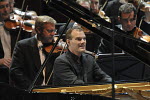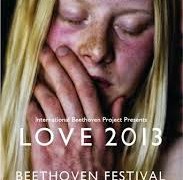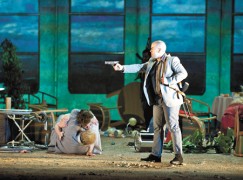Michael Kustow was the first commissioning editor for arts on Britain’s Channel 4. Restless, eclectic, endlessly innovative, he broke the mould of top-down arts broadcasting on British television and replaced it with programming that was at once challenging and viewer-friendly.
The 1980s on Channel 4 were a golden age of arts broadcasting the like of which we shall not see again.
Michael who had been in poor health for some years, died on Friday aged 74.

portrait by Tom Phillips
A group of artists from the Baltic and former Soviet states have gathered in Helsinki this afternoon to play out their differences.
Here’s their manifesto:
We have decided to get together to remind each other that the only sustainable way to solve our conflicts is by working together. This is a statement on behalf of all people and peaceful development.
We are facing huge shared challenges, so huge that we really do not need them to be further complicated by military encounters. If we want a chance to meet these challenges, we have to decide – today – to accept our differences. Not even our biggest disagreements justify abandoning peaceful, constructive practice.
Our ensemble of players is gathered from many countries. There are also strong differences of opinion amongst us. Still, confronting our common goal, a successful musical performance, we are perfectly capable of focusing on working together. We are proof of people’s desire to do good and to create beauty. This time we are not here to solve our problems, but to build common ground on which to face them.
Let us focus on giving the future a chance.
*
The concert is live-streamed here.

These are the players:
Participating artists
| Aalto-Setälä |
Kerttu |
flute |
| Ahtinen |
Timo |
double bass |
| Ali-Mattila |
Teppo |
violin |
| Antola |
Iida |
soprano |
| Anttila |
Martti |
tenor |
| Batiashvili |
Lisa |
violin |
| Bezrodny |
Anna Liisa |
violin |
| Binder |
David |
trombone |
| Brostek |
Magdalena |
cello |
| Bugnot |
Thomas |
trumpet |
| Buinovschi |
Ion |
violin |
| Büchert |
Mads |
timpanist / percussionist |
| Chousovskii |
Anton |
violin |
| Coleman |
Amelia |
english horn / oboe |
| Dmitri |
Ermilov |
trumpet |
| Dmitrjev |
Aleksei |
bassoon |
| Eerola |
Inka |
violin |
| Ernesaks |
Greta |
cello |
| Franzon |
Johanna |
violin |
| Frostén |
Harri |
violin |
| Gil Shaked |
Agababa |
clarinet |
| Gorkun-Silén |
Iryna |
flute |
| Grans |
Peter |
double bass |
| Grans |
Pontus |
double bass |
| Gricius |
Tomas |
trumpet |
| Gustafsson |
Jan-Erik |
cello |
| Haikola |
Anna-Leena |
violin |
| Heikinheimo |
Siljamari |
violin |
| Helander |
Jaani |
cello |
| Hendricks |
Barbara |
vocal |
| Hoffström |
Anna |
violin |
| Hohti |
Hanna |
viola |
| Hohti |
Markus |
cello |
| Holmström |
Emil |
piano |
| Horttana |
Helmi |
violin |
| Hurttia |
Linnea |
violin |
| Hyväkkö |
Jarmo |
clarinet |
| Indermühle |
Nicolas |
tuba |
| Itoh |
Eri |
violin |
| Ivars |
Mikko |
cello |
| Juris |
Dani |
bass |
| Juutilainen |
Hanna |
flute |
| Juvonen |
Sirpa |
viola |
| Jämsä |
Henna |
clarinet |
| Kares |
Jenny |
flute/piccolo |
| Kaukola |
Ritva |
viola |
| Kauppinen |
Maiju |
violin |
| Kilpeläinen |
Atte |
viola |
| Kitaeva |
Maria |
violin |
| Kivistö |
Jenni |
violin |
| Kivivuori |
Kimmo |
viola |
| Klas |
Eri |
conductor |
| Koistinen |
Arto |
viola |
| Koivisto |
Juha-Pekka |
violin |
| Komsi |
Nuppu |
violin |
| Koponen |
Matti |
violin |
| Koskimies |
Minna |
piano |
| Kotka |
John |
trombone |
| Kumela |
Petri |
guitar |
| Kupiainen |
Heini |
piano |
| Kuusava |
Kati |
violin |
| Kuusisto |
Pekka |
violin |
| Kärnä |
Noora |
contrabassoon |
| Laivuori |
Jaakko |
viola |
| Lake |
Carly |
french horn |
| Larionov |
Oleg |
viola |
| Latvala |
Tero |
violin |
| Lehikoinen |
Lotte |
alto |
| Lehto |
Tuomas |
cello |
| Lehtola |
Jarno |
tenor |
| Luolajan-Mikkola |
Mikko-Ville |
violin |
| Maalismaa |
Eriikka |
violin |
| Maijala |
Lilli |
viola |
| Malmivaara |
Paula |
oboe |
| Mattila |
Elina |
cello |
| Mellberg |
Niklas |
teorbi |
| Murdvee |
Mikk |
violin |
| Mussafia |
Barbara |
cello |
| Mäkinen |
Pasi |
trombone |
| Nikula |
Heikki |
bassclarinet |
| Nironen |
Sirja |
cello |
| Nisonen |
Tanja |
french horn |
| Pajuoja |
Hannu |
french horn |
| Palola |
Erkki |
violin |
| Parviainen |
Hanna |
violin |
| Pensola |
Minna |
violin |
| Podyachev |
Ivan |
viola |
| Pulkamo |
Kaisa |
viola |
| Raikas |
Johannes |
contrabass |
| Rantanen |
Simo |
trumpet |
| Raulamo |
Jaakko |
cello |
| Resjan |
Valeria |
piano |
| Reskalenko |
Olga |
viola |
| Rintamäki |
Sirkku |
mezzosopraano |
| Rinta-Rahko |
Anna |
double bass |
| Ristiluoma |
Riitta-Liisa |
viola |
| Rouvali |
Santtu-Matias |
conductor |
| Ruskeepää |
Tuomas |
french horn |
| Saarikoski |
Mauri |
violin |
| Salminen |
Annu |
french horn |
| Sarantola |
Markus |
viola |
| Schweckendiek |
Nils |
conductor |
| Segerstam |
Leif |
conductor |
| Severeide |
Päivi |
harp |
| Silén |
Sebastian |
violin |
| Stasevska |
Dalia |
viola / conductor |
| Stasevski |
Lukas |
cello |
| Sundroos |
Pia |
violin |
| Suomela |
Soineli |
oboe / french horn |
| Suoranta |
Antti |
timp / perc |
| Söderblom |
Jan |
violin / conductor |
| Takacs |
Zoltan |
violin |
| Tikkanen |
Antti |
violin |
| Tollet |
Susanna |
alto |
| van Treeck |
Outi |
flute/piccolo |
| Unkari |
Erja |
violin |
| Vehmanen |
Heikki |
viola |
| Vilhjámsson |
Ari |
violin |
| Viitala |
Jussi |
cello |
| Vilkman |
Camilla |
viola |
| Virtanen |
Sini |
violin |
| Vähälä |
Anna |
violin |
| Wikström |
Tomi |
timp / perc |
| Willey |
Pietari |
timp / perc |
| Ylivuori |
Sakari |
bass |
| Åström-Tiula |
Annemarie |
violin |
The great troubadour will turn 80 next month. In the new issue of Standpoint magazine, I write:
No musician has maintained a more assured equilibrium through good times and bad, riding the swings and roundabouts of outrageous fortune and misfortune without falling prey to the temptation of an easy fix.
And:
At 80, Leonard Cohen stands above his generation as a seer of lasting things, of values received and passed on. Other musicians have emerged richer, more famous. Some still twist and shout on stage, escorting their mob of semi-retired fans into a seventh age of twilight care. Cohen stands up there unchanged, addressing his audience with unfailing courtesy and curiosity, with a sense of continued discovery.
What is the source of that unerring strength?
Read on here.

Fascinating phone interview with Fiona Maddocks in today’s Observer here.
Rattle repeats that, come what may, he’s staying in Berlin after the job’s up in 2018.

Smug? They invented it.

Sad to report that neither of the countertenors got a sniff at the top prizes. The two high guys shared a $10,000 consolation slot.
The winners are:
Rachel Willis-Sørensen (US), 30, soprano

and Mario Chang (Guatemala), 28, tenor.

Rachel has already sung major roles in big houses – Mimi in Bohème at Semperoper Dresden and Countess in The Marriage of Figaro at Covent Garden. Mario has sung the Italian Singer in Der Rosenkavalier at the Met.
Full lineup here.
Victoria Mallory, the original Anne Egerman in A Little Night Music, has died of pancreatic cancer. She was married to Mark Lambert, who played Henrik Egerman in the same production. Their daughter, Ramona Mallory Lambert, played Anne in the 2009 Broadway revival.
Another sad loss to the Sondheim family, so soon after the irreplaceable Elaine Strich.

Message from Ivan Fischer:
Dear Friends, on this present tour I asked the Budapest Festival Orchestra to start a new life – to sing regularly. At the end of the Proms and elsewhere on tour we performed Abendständchen by Brahms as an encore only after three days of practice.
Why? Because people should sing! Mothers should sing to their babies, children should sing in children’s choirs and adults should rediscover this wonderful communication tool. So we should set an example and start to show that it is possible to overcome fears and inhibitions.
If you want to hear our very first attempt, please scroll to the end of the symphony, ca 45 minutes on this link:
http://www.bbc.co.uk/programmes/b04f8tqd

Jonathan Mills, outgoing director of the ever-less-relevant Edinburgh Festival, is (we hear) front-runner to be head of the Australian National Gallery in Canberra.

Nobody goes to Canberra.
I did it! Help ALS research and also other good causes and in memory of wonderful friends of the past, still present today in our hearts, like Hans Vonk, who died 10 years ago of ALS and Boris Pergamenschikow, who also died much too early 10 years ago.

Click here to watch.
George Lepauw, who failed to pay many of his Chicago performers last year, has ‘with a heavy heart’ announced the cancellation of next month’s festival. He is under a boycott warning from the musicians’ unions.
Cancellation here. Apology nowhere. Love? Doesn’t know what it means.

Now the Met’s season is going ahead, opposition to its production of John Adams’s opera, The Death of Klinghoffer, has intensified. We have been forwarded a complaint by a Met supporter and a response by Ann Ziff, on behalf of the board of the Metropolitan Opera.
Read, and wonder.

Dear Ann and Members of the Board,
As a longstanding opera lover and patron of the Metropolitan Opera, I am writing to add my voice to the chorus of objection to your upcoming production of The Death of Klinghoffer.
I was shocked to be forwarded an email about the opera, including but not limited to the following:
In the opera’s libretto, there are passages that defame the Jews as a people. For example, the principal terrorist says, “Wherever poor men are gathered, they can find Jews getting fat. You know how to cheat the simple, exploit the virgin, pollute where you have exploited, defame those you cheated, and break your own law with idolatry.”
At one stage, the terrorist leader says to Klinghoffer, “America is one big Jew.”
The opening scene honors terrorists. It is set against a backdrop of graffiti on a wall proclaiming “Warsaw 1943, Bethlehem 2005,” implying a moral equivalence between the acts of the Nazis and current day Jews.
While I support artistic freedom, the language is inflammatory and dangerous, particularly in a time of rising anti-Semitism around the world. There is no artistry in such language: it is the language of hatred and violence, and such words do not belong on the stage of one of the world’s greatest and most respected opera houses.
As leaders of the Metropolitan Opera, you have the opportunity to take a stand for world peace by canceling this production, rather than giving a platform to the voices of terrorism and anti-Semitism.
Sincerely yours,
(name withheld)

Dear (name withheld)
Thank you for your email about The Death of Klinghoffer, which may have been influenced by what I believe to be a wholly unfair disinformation campaign about the opera led by some radical groups that would like to have it suppressed. But the opera is neither anti-Semitic or pro-terrorist. In fact, it is one of the greatest operas of the last twenty five years, composed by one of America’s leading composers. Peter planned this presentation of Klinghoffer five years ago as part of an overall artistic initiative to introduce all three of John Adams’ major operatic works at the Met. Previously, as I am sure you know, we have produced Adams’Doctor Atomic and his Nixon in China.
Klinghoffer is arguably Adam’s best opera of all. Although tackling a very difficult subject, it is a towering work of composing genius. In this new production, hailed by the critics when it was first presented in London two years ago, there is no ambiguity in the staging that the murder of an innocent man at the hands of terrorists was manifestly unjust. The lines you cite from the libretto are the words of the terrorists, and taken within the context of the entire opera, are self-condemning hateful words meant to prove their bias and slanderous views.
While there have been some requests that we cancel the performances, many prominent patrons of the Met—both Jews and non-Jews—have voiced their support of our position to stand firm. The Anti-Defamation League and the Klinghoffer daughters, themselves, have not called upon the Met to cancel its presentation, since they agree that Klinghoffer does not deserve to be suppressed. We believe that it would cause the Met far greater harm if we were to cancel its presentation, since such an action would indicate that we have surrendered our artistic principles.
In the Board’s opinion, great art should not be the victim of political imperatives. I appreciate your writing me and the Board about this issue, (name withheld). And I am glad to know from your email that you also stand behind artistic freedom.
As always, thank you for supporting the Met. I look forward to seeing you in the fall.
Best wishes,
Ann













